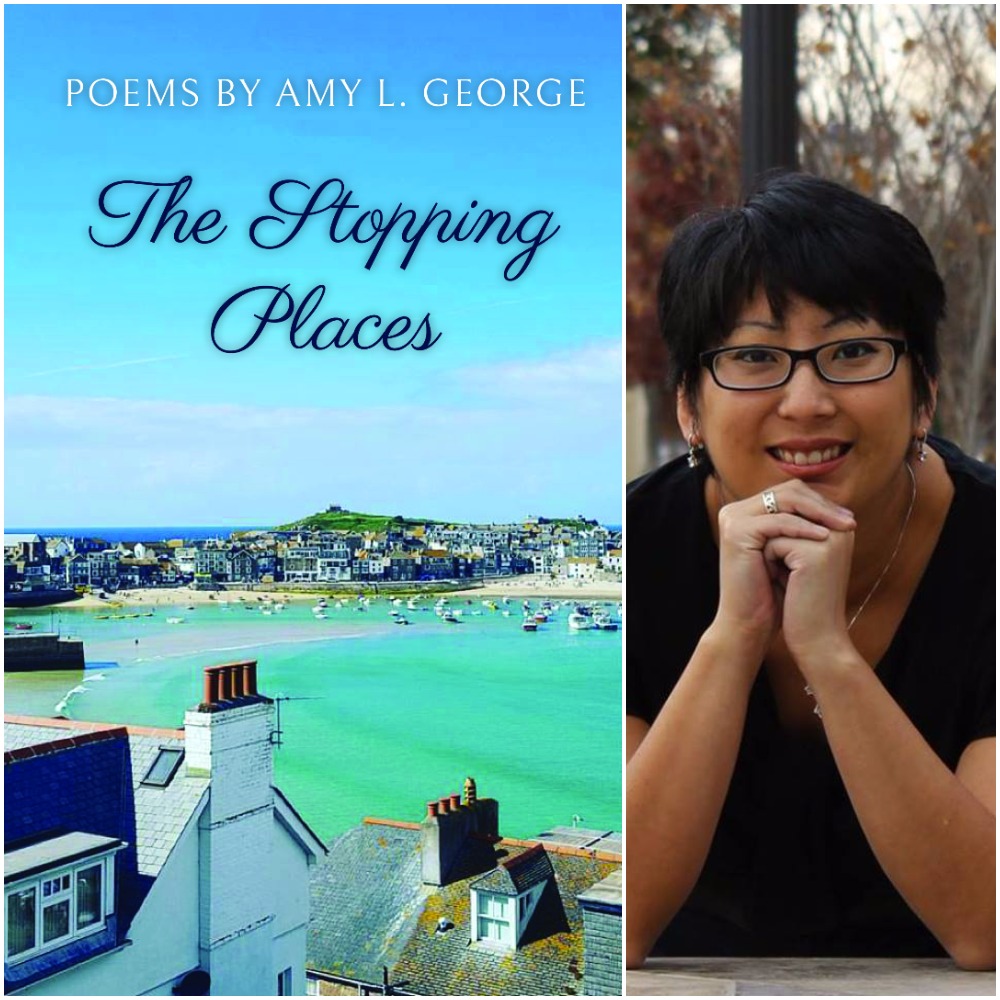“There’s a road on every tombstone,” begins Amy George’s gentle and dulcet journey through her seasons, measured and soft, yet rich in imagery and delicate speech. After reading, I want to stretch out on a hammock and try to remember all I’ve missed in my hustling, frenetic day. If you like to be calmed and yet led toward substance, reassured, yet brought to crossroads amidst the movement and pulse of our condition, then this book is for you. “I learned how to paint joy, rest, serenity… and when the time came, farewell.” We get to read the poems, but The Stopping Places provides all the richness and variety of three-dimensional, visual art.
–Edward Nudelman, Author of Out of Time, Running and What Looks Like an Elephant
“Memory, dreams, and seasons changing— layered voice of introspection, looking back on “the travel of the lines”— learning what the natural world gives, is the experience to live wholly, without regret or apology, for this one life. George’s lyric poems moved me unexpectedly, making me pause and take notice of the elegiac undertow that pulled me closer to knowing the ‘you,’ who is a braid of three persons— self, loved one, and ultimately, God. It’s this ‘you’ whose identity becomes legacy in The Stopping Places.”
–M.J. Iuppa, Author of Small Worlds Floating (Cherry Grove Collections, August 2016) and forthcoming, This Thirst (Kelsay Books, September 2017).
Reading The Stopping Places by Amy L. George, one hears two voices from American poetry: Robert Frost in “Stopping by Woods on a Snowy Evening”: “But I have promises to keep/And miles to go before I sleep” and Walt Whitman in “Song of Myself”: “All goes onward and outward, nothing collapses/And to die is different from what anyone has supposed, and luckier.” Like them, George is a poet of balances: of joy in life and death, of experience and what may be lost (except to memory) and what is gained through loss, of spirituality and sensuality, to name a few. In the prefatory title poem, the first line tells us “There’s a road on every tombstone.” George takes us on that road. Along the way, she tells us: “I forget the sound of the clock/ticking in its impatience….” (in “Focus”), “The right words will be right behind us…. (in “Burn the Chaff”), “Your absence has transformed me….” (In “Propulsion”), and “I paid attention to the correct way/to paint the sound of journeys….” (in “Ideogram”). In poem after poem, she certainly has paid attention: one sure word and image after another.
–Antonio Vallone, publisher, MAMMOTH books and poetry editor, Pennsylvania English
The Stopping Places by Amy George exudes quiet charm, a reflective search for identity while straddling two cultures. George draws on her Korean heritage in delicately painted landscapes, “To teach me our mother tongue, / language of brush and ink,…Because of your hands, /I learned how to paint joy, rest, serenity…/and when the time came,/ farewell.” Her lyrical narratives are deeply contemplative as language and memory tug at the boundaries of emotion. Occasionally a wistful tone recalls the ambivalence of displacement, “the homeland/that only remembers me /as its acquaintance/ and not as its child,” and as she tries to make peace with this, George is unflinchingly aware of the distance traversed “There’s a road on every tombstone./ A journey is traced / in a single dash.” At the heart of these poems the reader will find a captivating authenticity. Most of all, The Stopping Places is a testament to the human spirit.
–Ami Kaye, Publisher & Editor, Glass Lyre Press, Publisher & Editor, Glass Lyre Press






Marjorie Maddox –
In her newest chapbook, The Stopping Places, Amy L. George proclaims early on, “The length of the trip/doesn’t matter as much/as the exits we take.” And so it is not so much this poet’s journey across time, seasons, and continents that intrigues us, but the specific exits she chooses. Her well-timed “stopping places” give both sight and insight: a heron outstretched is “a blue gray angel to bless us”; two clouds are “the warm blanket ache of shadow,/the joy of faithful light.”
Indeed, much of this thoughtful collection focuses on separations and reunions. We watch as a veteran “shuffles to the door…past hanging out/of his back pocket.” We pause to reflect as [t]he day’s patina/burns orange [and] Sky grows weary/of bearing the blossoms….”
Throughout, George gives her readers many ways to “paint the sound of journeys” that lead toward “joy, serenity…farewell.” She takes us to Korea, “the homeland that only remembers [her] as acquaintance.” We learn heritage through a lesson in ideograms: “To teach me our mother tongue,/language of brush and ink,/you placed your hand over mine.” And always, we come back to nature and a desire to “inhale/the wildness of the world.” We also come back to relationships: “If I were Picasso, I would paint love/in tight red circles,//silken lines like thread//from tattered kimonos.”
As George reminds us in her poem “Focus,” “all action follows breath.” May these poems prompt us to pause at our own “stopping places,” breathing in and inspired by all that the world has to offer.
-Marjorie Maddox, author of Transplant, Transport, Transubstantiation, http://www.marjoriemaddox.com
Nancy Dafoe –
Metaphoric Threads Weaving Life’s Silk Kimono,
A review of Amy L. George’s The Stopping Places
by Nancy Dafoe
Amy L. George gently invites readers to pause and take in moments with the poet’s persona as she stops at places along life’s journey. “The Stopping Places” (Finishing Line Press, 2018) is a profoundly lovely chapbook of poems anchored by four seasons of life. We move through the spring, summer, autumn, and winter to places connected by metaphoric threads of George’s silken lines. Those threads are slowly woven around us into a storied kimono.
Creating the conceit of written lines as threads of fabric, George opens with Spring, that season in which “life was nearer than death,” and we feel both the exuberance of the fledgling and the slight fear of what is unknown: “when the world/ becomes a bigger place, / even the mirror enlarges itself. //And though we may not realize it, our shadow becomes that of a giant’s.” We embark upon a journey with the poet’s persona in which “all things new and/ waters uncharted” in the poem “Compass.” Always with us in Spring is that fleeting shadow of childhood running and chasing against time.
Imagery scorched by sunlight floods into the second section of George’s chapbook, Summer. The poet’s mastery over technique is everywhere apparent with metaphors and catachresis taking our breath: “spiders spun their fragile dreams” in “Zen Garden” and “the sound of seagulls/ crying as they wheeled/ through cloudy portals, the breathing of the waves” in “Memory.” Sound echoes with “cicadas humming,” in “Rowboat,” yet the persona remarks on forgetting “the sound of the clock/ ticking in its impatience” in “Focus.”
Autumn finds that the “trees [have] ceased applauding” in this life before winter, “before the dark curtain fell.” We watch “The Performance” with the poet and by the poet as “an invisible baton” conducts even the trees with their dance of leaves. Playing with puns, George gives us leaves and leaving: “Some evenings when the wind/ blows leaves across my path/I remember how it felt” in “Before We Disappeared.” In “Focus,” the poet writes, “let the migrant wind/ embrace me.”
While winter chills and causes us to ache with images of snow covering footsteps, even memories, George offers far more than loss and leaving in the last section of The Stopping Places. Although we linger in places where “those who’ve slipped away” and hear the world “hushed” and notes “faded,” the Poet is sublimely creator. She “paints the sound of journeys” in “Ideogram” and other poems in this final section of the chapbook. Poet has asked us to stop and linger but also continues to move us forward throughout The Stopping Places and in “Propulsion (in memory of those who’ve slipped away).” Amy L. George colors her lyrical last act of “Sayonara” in Winter with the lifeblood of the artist: “If I were Picasso, I would paint love/ in tight red circles, / silken lines like thread/ from tattered kimonos.”